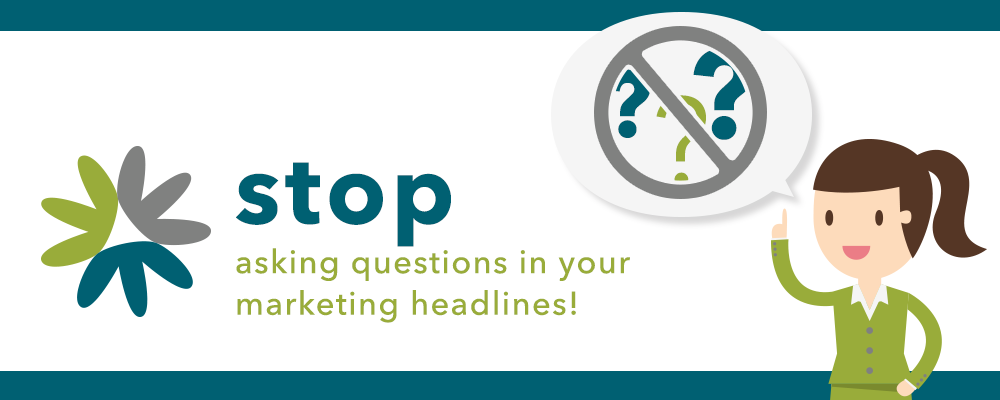Some people might get mad at me about this post, but I’m not going to apologize. I’m on a one-man quest to rid marketing and advertising headlines of questions, and here’s where I’m going to explain the “science” behind my stance on this topic.
First of all, a term …
Headline = The usually short phrase, typically in a larger font and contrasting color, that is supposed to grab your attention in a piece of advertising or marketing copy.
You’ve seen headlines on postcards, magazine ads, TV ads, on websites, brochures, and especially billboards on the side of the road. Headlines are everywhere, trying to grab your attention.
Examples of questions in headlines
“Are you paying too much for your health insurance?”
“Do you want more traffic to your website?”
“Is it time to sell your home?”
Why are question headlines bad?
Oops, let me fix that for you.
Why question headlines are bad.
See what I did there? You can take almost any question and turn it into a statement.
“Is it time to sell your home?” becomes “The time is right to sell your home.” Or even better … “The time is right NOW to sell your home.”
“Do you want more traffic to your website?” becomes “You know you need more traffic to your website.”
And my favorite … “Are you paying too much for your health insurance?” becomes “Find out how much you can SAVE on your health insurance by …”
If someone is designing an ad for you, and they give you a question headline, figure out how to make it a statement. It takes just a few minutes and the effectiveness of the headline increases dramatically.
Let’s get into the science or psychology behind this topic
There’s an axiom in marketing that “people make purchasing decisions from their emotional center, not their cognitive center.” Stated more simply, people buy with their heart, not their head.
The goal of marketing and advertising is to put (and keep) a person in a state of influence. The best influence is emotional. Why do Apple and Nike have, arguably, the most loyal and fanatical customer base? It’s because their advertising consistently evokes emotion.
The second you ask a question in a headline, you lose your ability to effectively influence them because the person is forced into their cognitive center to answer the question. And here’s the futility of it all. The answer is usually an easy “no.”
“Are you paying too much for your health insurance?” … “No.” (throws the postcard into the recycling bin without even reading the rest of it and continues on with their day)
Write a better headline
So the next time you create an advertising piece, put more time into creating the best headline you can. Or hire a professional to do that for you. Whatever you do, please don’t ask a question in the headline!
Figure out a way to evoke an emotion about your product or service and watch the response to your advertising dramatically increase!

